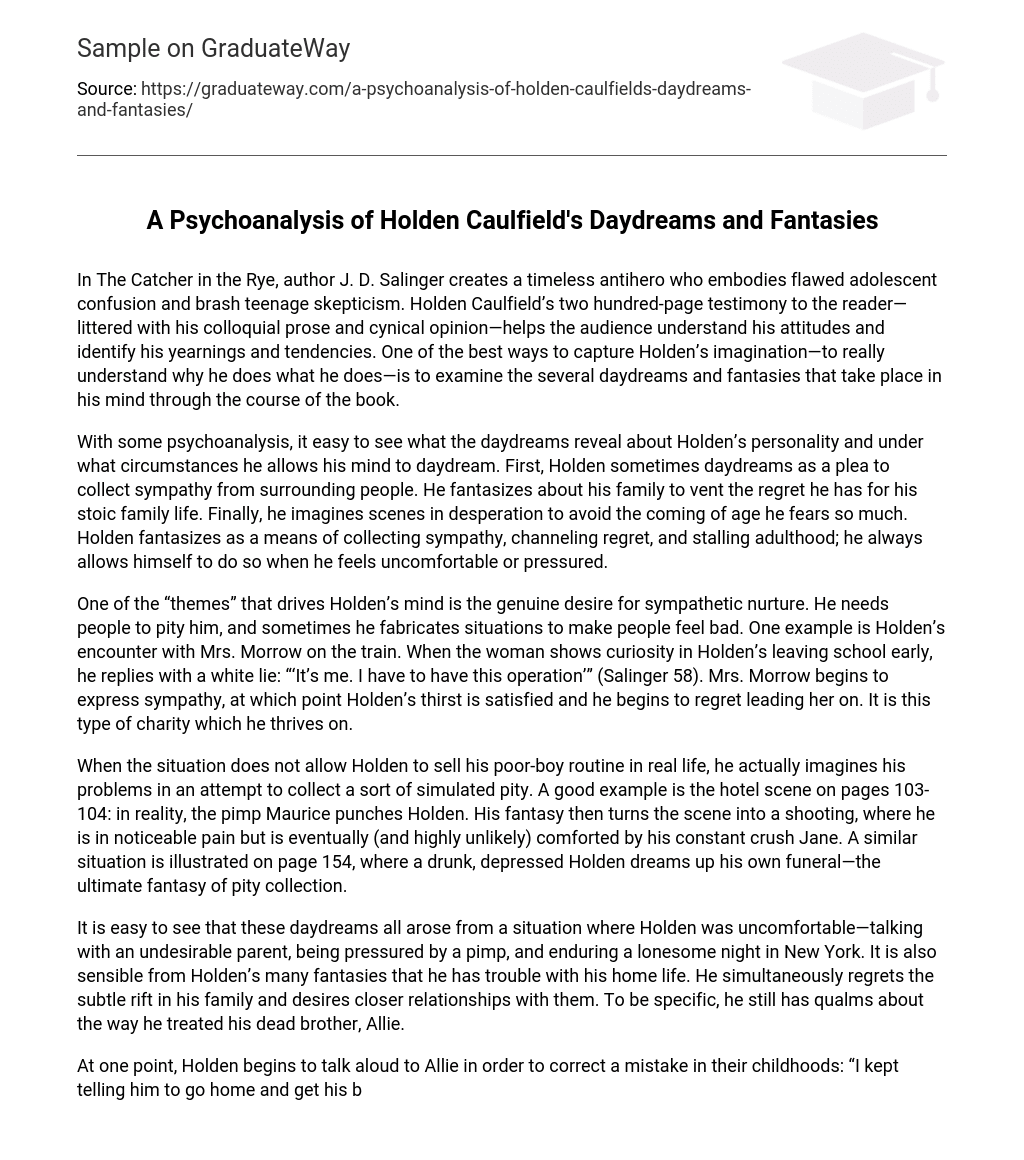In The Catcher in the Rye, author J. D. Salinger creates a timeless antihero who embodies flawed adolescent confusion and brash teenage skepticism. Holden Caulfield’s two hundred-page testimony to the reader—littered with his colloquial prose and cynical opinion—helps the audience understand his attitudes and identify his yearnings and tendencies. One of the best ways to capture Holden’s imagination—to really understand why he does what he does—is to examine the several daydreams and fantasies that take place in his mind through the course of the book.
With some psychoanalysis, it easy to see what the daydreams reveal about Holden’s personality and under what circumstances he allows his mind to daydream. First, Holden sometimes daydreams as a plea to collect sympathy from surrounding people. He fantasizes about his family to vent the regret he has for his stoic family life. Finally, he imagines scenes in desperation to avoid the coming of age he fears so much. Holden fantasizes as a means of collecting sympathy, channeling regret, and stalling adulthood; he always allows himself to do so when he feels uncomfortable or pressured.
One of the “themes” that drives Holden’s mind is the genuine desire for sympathetic nurture. He needs people to pity him, and sometimes he fabricates situations to make people feel bad. One example is Holden’s encounter with Mrs. Morrow on the train. When the woman shows curiosity in Holden’s leaving school early, he replies with a white lie: “‘It’s me. I have to have this operation’” (Salinger 58). Mrs. Morrow begins to express sympathy, at which point Holden’s thirst is satisfied and he begins to regret leading her on. It is this type of charity which he thrives on.
When the situation does not allow Holden to sell his poor-boy routine in real life, he actually imagines his problems in an attempt to collect a sort of simulated pity. A good example is the hotel scene on pages 103-104: in reality, the pimp Maurice punches Holden. His fantasy then turns the scene into a shooting, where he is in noticeable pain but is eventually (and highly unlikely) comforted by his constant crush Jane. A similar situation is illustrated on page 154, where a drunk, depressed Holden dreams up his own funeral—the ultimate fantasy of pity collection.
It is easy to see that these daydreams all arose from a situation where Holden was uncomfortable—talking with an undesirable parent, being pressured by a pimp, and enduring a lonesome night in New York. It is also sensible from Holden’s many fantasies that he has trouble with his home life. He simultaneously regrets the subtle rift in his family and desires closer relationships with them. To be specific, he still has qualms about the way he treated his dead brother, Allie.
At one point, Holden begins to talk aloud to Allie in order to correct a mistake in their childhoods: “I kept telling him to go home and get his bike and meet us outside of Bobby Fallon’s house” (Salinger 98). Many regrets about trivial matters like these sum up to what Holden believes was an undeserved mishandling of Allie, something that still troubles him. He also wishes he had a closer relationship with his mother. This can be shown by his episode with Ackley in the book’s beginning: “Then I started horsing around a little bit…‘I think I’m going blind,’ I said in this very hoarse voice. Mother darling, everything’s getting so dark in here’” (Salinger 21). It is possible Holden’s “horsing around” is actually a subconscious cry for his mother; his games might be much deeper than he is willing to admit. Again, all the situations that produced these fantasies—Holden’s scene with Sunny the prostitute and his response to his roommate Stradlater going out with Jane—are uncomfortable and undesirable for Holden. Finally, it is noticeable from Holden’s fantasies and daydreams that he is desperate to avoid growing into adulthood.
This is especially true toward the end of the book, after a weekend of frightening self-discovery and many encounters with less-than-innocent adults. At this point Holden makes two separate, desperate claims in attempt to “escape” adulthood by going away. The first is made to Sally Hayes after their date: he starts with the erratic “‘Here’s my idea. How would you like to get the hell out of here? ’” (Salinger 132-3). Naturally, Sally declines, but not after Holden becomes angry at her and grows even more desperate in his pursuit of escape.
Soon after that, Holden tells Phoebe about his newly-hatched plan to leave again: “‘I know this guy whose grandfather’s got a ranch in Colorado. I may get a job out there’” (Salinger 165). It seems that in his desperation, he was subtly informing Phoebe of his idea, as if he was trying to extract her approval. Both of these instances, of course, were products of pressure on Holden. After extensive analysis on Holden Caulfield’s fantasies and dreams, it is easier to pinpoint his desires and tendencies.
Holden’s daydreams begin when he is forced into a high-pressure or uncomfortable situation. His imagination creates one of three scenarios at times like these: a situation where he can be pitied upon, one where he can reconcile his lost family ties and closeness, or one where he can escape the coming terrors of aging. While Holden may use these phenomena as portals of self-discovery, The Catcher in the Rye readers have discovered that the fantasies lucidly reveal Holden’s hidden insecurity and utter confusion.





